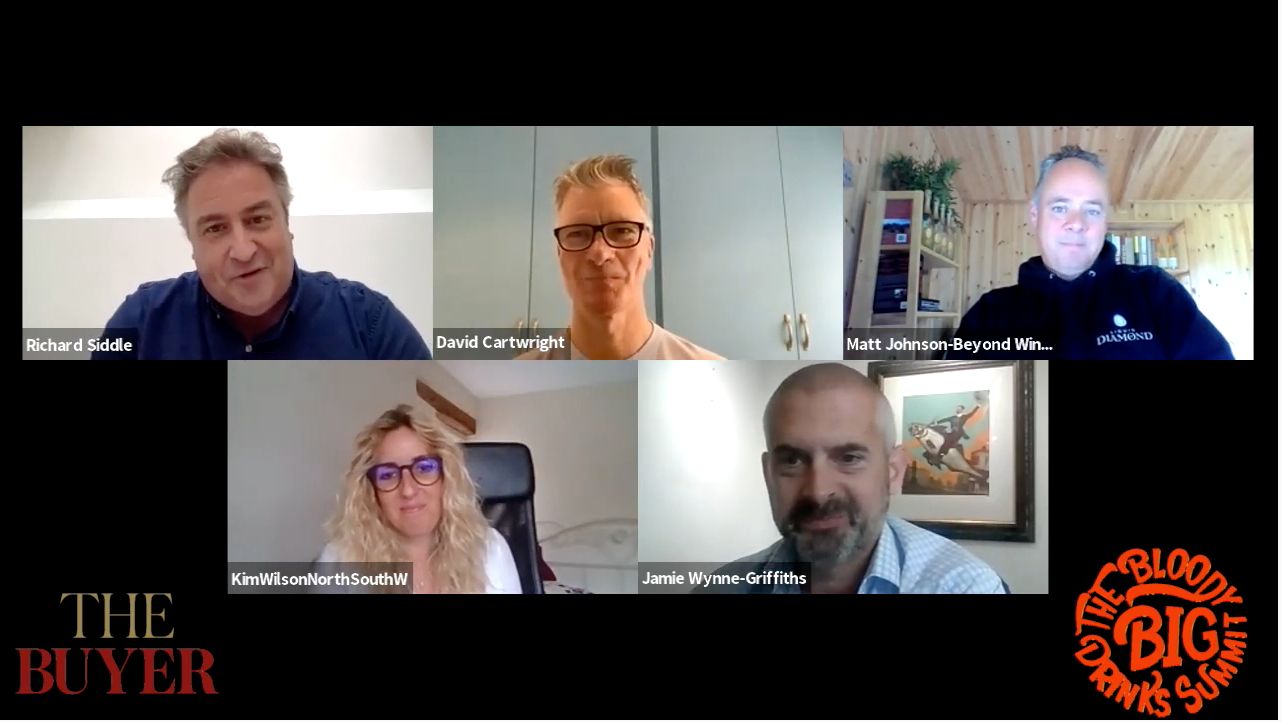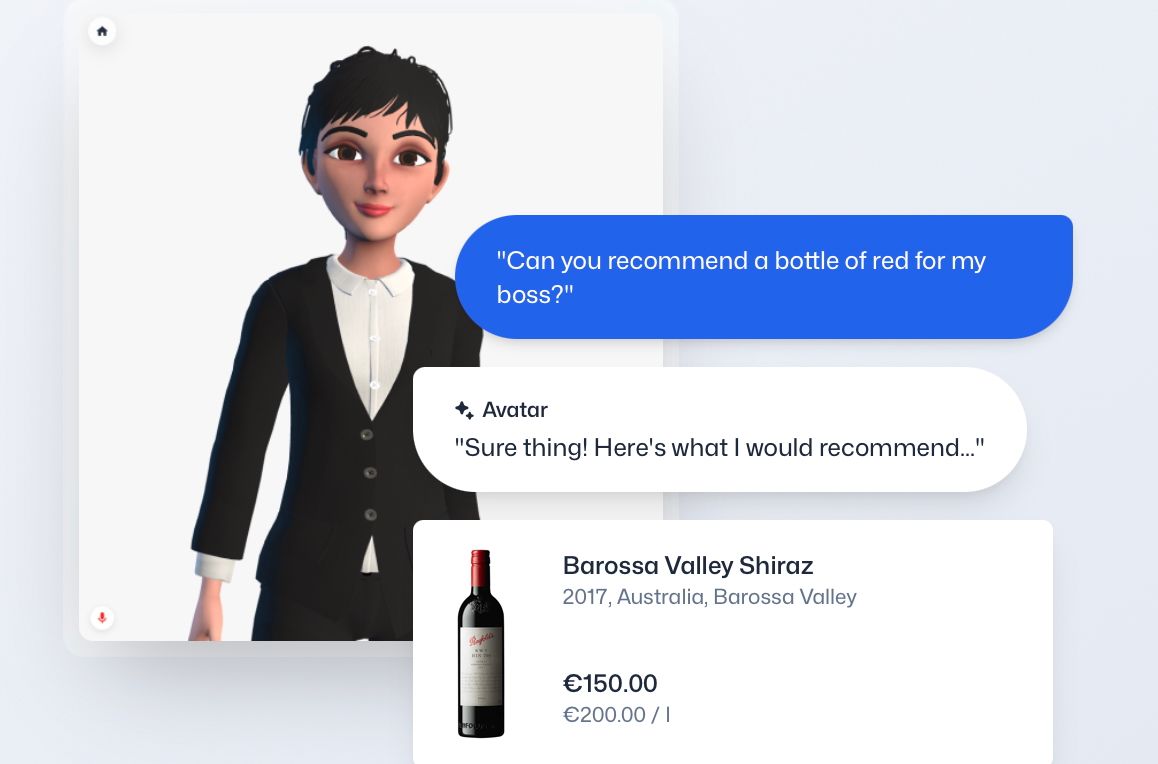Our thanks go to David Cartwright, sales director, Seckford Wine Agencies, Kim Wilson, managing director of North South Wines, Matt Johnson, co-founder of Beyond Wines and Jamie Wynne-Griffiths, founder of Propeller for taking part in our buyers’ debate and to the Bloody Big Drinks Summit in Australia event for asking The Buyer to host the debate as part of its first webinar conference held last October. You can still access other debates held during the event here.

The Bloody Big Drinks Summit was an opportunity for producers, retailers and distributors to come together to discuss better ways of working together across beers, wines and spirits. The Buyer was the UK media partner asked to take part by our hosting our own UK importers panel.
If you went to your local book store and tried to find anything on how to buy wine professionally then chances are you will come away disappointed. There simply is not a “how to” guide you can pick off the shelf that tells you how to do it. You might be better off going to the psychology section such is the complexity and myriad of factors that determine how one wine buyer selects the wines from their list over another.
Which is not much use for a wine producer looking for business partners to work with for the wines they have made. But there are certain dos and don’ts that the majority of wine importers follow that you need to know if you want to break into such a competitive market as the UK.
To find pin down exactly what those are we asked four very different types of UK importer to give their on the ground advice on how best a producer, from anywhere in the world, but particularly from Australia, might get their wines listed in the UK.
Seckford Agencies
Seckford Wine Agencies is ideally placed to ask as it is a business that has developed over the last 20 years to become a “one stop shop” for New World wines – with around two thirds of its producers coming from South Africa and the other third split between Australia and New Zealand. Its primary focus is working with quality, privately owned wineries with the majority of its portfolio retailing above £10.
Its range includes: Bird in The Hand and Mollydooker from Australia; Rustenberg, DeMorgenzon, Kanonkop and Bouchard Finlayson from South Africa; Escarpment and Waipara Springs in New Zealand – amongst many others.
All its producers wines are held in bond in the UK ready to be shipped directly to its customers, says sales director, David Cartwright.
North South Wines
North South Wines is a good example of a growing number of importers in the UK that are part owned by producers around the world.
Kim Wilson, managing director of North South Wines, says it deliberately set out when it started the business seven years ago to have just under (48%) of its ownership with producers for two key reasons. First it gave the business some solidity and reassurance that it had long term support to be able to make the right decisions about which wines it should be importing and selling. It also gave them invaluable insight into what producers actually want and need from their supplier.
Equally the producers are assured of a direct route to market in the UK and hands-on the ground expertise about what is really going on in the UK, she adds.
That 48% producer investment is now shared between De Bortoli Wines from Australia, The Wine People in Italy and Reh Kendermann in Germany. It’s a strategy that has seen North South Wines go from a standing start, seven years ago, to importing 1.5m 9 litre cases and an annual turnover of around £31m and a team of 25.
Beyond Wines
Beyond Wines can still count its time in business in months rather than years – it first started in the summer of 2020 – but that belies the experience of its two founders, Alex Green and Matthew Johnson, who have both worked for major suppliers and producers, including Copestick Murray, Freixenet Copestick and Romanian producer, Cramele Recas. They both saw an opportunity to offer a different take on what some of the larger suppliers can do as an agency business, but also create and drive their own brands too – with its premium Prosecco brand, Liquid Diamond, the first to be launched.
Propeller
Click here for Jamie Wynne-Griffiths, founder of Propeller, explaining why he believes it is disrupting the traditional importer model
Jamie Wynne Griffiths is founder and managing director of Propeller, a new “disruptor, incubator” wine importer model that has set out to offer a new route to the UK by not having a traditional agency model, but rather working on a retainer, consultancy basis to seed wineries into the specialist and independent merchants sector and give them a foothold in the sector.
He says the Propeller model is actually in response to the pandemic, and before that the build up to Brexit, in that it could see a “bottle neck of really interesting boutique producers that were finding it extremely hard to get into the UK” and that log jam was not going to open up any time soon – particularly within the major players.
But as the pandemic hit and demand in independent wine merchants soared they were soon “craving new and interesting and potentially more challenging wines” at just the time some of the bigger wholesalers “were playing it safe”.
The Propeller model is all about acting fast and getting producers into the market now and selling wines without having to go through the usual hoops of tastings, checks and delays. That way the producer owns their own stock in the UK and they agree to pay Propeller a retainer fee for selling it to independents, with a standard wholesaler margin added in that they retain.
After 18 months they can either decide to stay with Propeller on a more traditional agency model or look to move to another distributor where they might by then be selling up to 150 cases to independents – “which is a totally different conversation” – where the wholesaler’s margin is already built into the business plan.
Four different takes on getting wines from around the world on to the shelves and wine lists of their on and off-trade customers.
Channel management
Key to any export strategy in the UK is to get your channel management right. The good news is there are few, if any, barriers – or tiers, or monopolies – to worry about. If you want to go direct and manage your distribution yourself you can.
Each of our importers have a slightly different channel breakdown with Seckford, North South Wines and Beyond Wines working with both larger supermarket accounts, as well specialist retail and the on-trade. Propeller’s focus ,up to now, has largely been building distribution with the growing independent wine merchant sector. North South Wines and Beyond Wines also have a healthy business supplying the convenience retail and cash and carry sectors.
Again for Wilson being multi-channel means having a business model that is “future proofed”. A strategy that has paid off over the last 18 months during Covid-19 when the on-trade was effectively closed for so much of 2020. It meant the 20% of its turnover that was going to the on-trade could be easily moved to what was the booming retail sector.
Whilst major supermarket contracts can usually be serviced direct through UK bonded warehouses, importers, including all our four panelists, will use regional wholesalers to work with independent retailers and the on-trade.
(Click here for what UK importers ultimately do and don’t want from their producers)
Point of difference
It’s not just the range you have that is important, stresses Cartwright, it is how creative you are as as supplier that can really make a difference. That’s what customers are looking for from an agency like Seckford. The ability to offer new ideas and think differently from other suppliers. It’s a factor that producers should think about when deciding which importer to work with. How creative are they?
It’s also how Cartwright has looked to build Seckford’s business with supermarkets over the seven years he has been with the company. He knows they are less likely to pick up the phone to a smaller player so it is up to them “to be more creative”. That’s how the multiple sector has become “big news” for the business, he adds.
Wilson says she relies on her suppliers “knowing where their place in the market is”. “A medal won’t get you on shelf, it’s what else that comes with it that counts. Knowing your clear USPs are and your route to market is really important,” she says.
Size and scale
The days of UK importers having phone book sized lists of producers have gone – except for the few major national distributors. It not possible for medium and small sized importers to effectively service tens of producers on their list.
Matthew Johnson says Beyond Wines “will never take more than 15 partners. That’s our key number and that won’t change.” He adds: “I have seen first hand what happens when you take on too many – you can’t look after those people properly.”
Propeller’s model is somewhat different in that it is all about “constantly bringing on new” producers – it managed to sign up over 20 in its first year – and it can be looking to source wines and producers around the world where there might be able to plug short term shortage
North South Wines works with around a further 25 producers on an agency supplier basis.
What excites UK importers?
(Click below to see what really gets an importer excited about a new potential producer, and conversely what it is that immediately turns them off with David Cartwright at Seckford Agencies.)
David Cartwright says it is vital a producer has done its research about who Seckford is, what it stands for and what other producers it has in its portfolio. Are they up to the quality and standard of Rustenberg in South Africa or Bird in the Hand in Australia? If yes, let’s talk. If not then chances are there won’t be place for them in Seckford’s range. “That’s the standard they have got to reach.”
He would also want to know if they have worked in the UK market before and are they clear about what they want to achieve. Do they just have certain products they want to sell, or are they interested in looking at the needs of the market and adapting what they do to suit?
That way he can quickly see if there is a natural fit with Seckford, or, if not, he might be able to point them in the direction of another type of importer.
The ones that stand out, he adds, are the producers that really understand the UK supply chain and the lead times and basic expectations there would be about doing business together. True partners that are prepared to listen to his expertise and experience and not try and tell him how to do his job. That is not going to go down well.
“We are the more traditional of the four models here. We are not trying to produce a Tesla. We are trying to sell amazing wines from great producers to retailers who trust me. Whatever we take on has to share our values.”
But he stresses: “There are always opportunities so a bit of research before they send that first email will pay massive dividends.”
Getting the basics right
(North South Wines’ Kim Wilson on what she looks for in a new wine producer)
Kim Wilson at North South Wines agrees with Cartwright that it’s vital a producer knows how it works and what makes it tick. That’s just the basis for doing good business together.In fact it has deliberately re-worked its website to make it even clearer for producers to understand its routes to market and how they might work with North South Wines.
“To get an email that shows they have not done any of that research usually goes straight into the bin,” she says.
What she is most interested in are those producers that have taken the time to identify where there are any gaps in its portfolio that a potential winery might be able to fill and how. Then they need to be really clear about what their initial expectations are. If those are totally unrealistic then it’s unlikely they would carry on the conversation.
“First impressions really do count,” she says. “To have a charismatic, knowledgeable point of contact between us and someone at the winery makes a massive difference. The UK market works at massive pace and we need to work with people who are quick and do not drag their heels.”
The big frustrations, she says, comes with those producers that “can’t get the basics right” like having a good product shot for every wine in their portfolio and a toolkit to help them with digital marketing and having active social media platforms and up to date website. Yes, they can help producers with that, but that would come at an additional cost to them.
She is, though, very open to receiving samples as that is often the best way to get to know a producer is having a bottle of their wine in your hand so you can see, taste and analyse what it stands for. It’s also a way for her team to benchmark that wine against others in that price range and from that country or region.
It’s a process she and her team will go through when looking to take on say a new Argentinian Malbec. It won’t assess a wine on its own, but against a full range of competitors to see how it compares.
Her other big no, no? Those producers who ask for 30 day payments terms before they have even sold a bottle of wine. That is a big red flag and shows the producer has no idea of what it means to work in the UK market.
“As agents and distributors we’re here to offer value and a service, we’re not here to fund their brand for them,” she stresses.
Can you work together
Matt Johnson says it all boils down to relationships and deciding very quickly whether you are likely to want to work together. Or as he puts it: “I can pretty much work out if I can going to work with somebody after the first conversation. They have not only got to understand the UK market, they have got to be personable and want to really do this. I get so many emails from producers who show you their award winning wines, but they have not done their research. We need a lot more than having good quality wine. We expect that as a bare minimum. That is a given.”
Johnson says a lot of his work is managing expectations from producers, particularly in terms of the sort of access they can get to major buyers in big retail chains. He says he has producers coming to him “who think we can talk to Tesco or Sainsbury’s whenever” we like. “It just does not work like that. We don’t have that option. It is down to them and we need producers to understand that from the outset as well.”
Wilson agrees: “My business would not be how it is today without the amazing producer partners we have got on board. But that’s because we have a proper partnership and they almost become part of your family.”
Quality wine is a given…
(Jamie Wynne-Griffiths on why having quality wines is a given. Producers have to offer so much more to break through)
Wynne-Griffiths says the issue comes when a producer simply cannot see that there wine is not suitable for a UK palate. So the quality issue is not always a “given” as perceptions of what good quality is can differ enormously.
For him the “packaging has to be great” even when working in the specialist independent sector. “The majority of people there still buy with their eyes. Be that a classic presentation or a really striking contemporary one”.
The pricing, he says, also has to be “realistic” even with its model that allows it to give the producer more margin than they would normally get in a traditional distribution deal. “We need to set that product up for the long term with the right margin in it.”
It can therefore come as quite a shock to a producer when they put all the ex cellar, supply chain costs, shipping, logistics, duty, wholesaler and retailer margins and VAT together on a spreadsheet and understand their A$10 wine is going to be at least £21 on a shelf in the UK to make the margin they need.
They are then even more aghast when after some category analysis from the Propeller team they realise they actually need to sell it at closer to £17 if they want to compete with other wines in their same peer group.
But it’s key that both sides come to an agreement on pricing and margin they are both happy from the outset or it is quickly coming to come apart.
It has, he admits, resulted in some very difficult conversations – most notably with some Bordeaux producers who have not taken kindly to be told what price they can sell their wine at.
Benchmarking is “critical”
Conversely he has been able to strike up deals with producers – like an Australian wine group – that have been willing to make the necessary changes to the wines and pricing in order for them to get listed in the UK. He says in that case the original wines sent for tasting were simply not to the level needed, but the pricing was, even though they had performed very well in other markets.
This particular wine group was quite happy to take Propeller’s UK category advice and taste wines that were performing well in the UK and then benchmark and make wines that matched that quality at the original price point. He says that “refreshing pragmatism” is an approach he hopes many other producers follow.
How open a producer is to benchmark their wines against their competition is also a good sign to see what sort of business they are to work with, says Wilson. She sees benchmarking as vital in building that two way respect between the importer and the producer and how they are going to be able to work together.
“I am no winemaker, but I know how to taste commercially and I know what the market wants.”
All it might take is a few tweaks to the style to make it appropriate for the UK, but both sides need to be open and happy about that, says the panel. “Benchmarking is critical,” says Wilson. “We have to do it so there is no reason why a producer shouldn’t.”
Matthew Johnson says his work with Romanian producer Cramele Recas shows how effective good benchmarking is as it has been able to produce good quality, but vitally commercially savvy wine that can sell in multiple markets around the world, with just a few tweaks here and there to suit the local palates.
Gaps in the market
The panel then assessed where they think the genuine gaps in the UK wine market. Johnson says that even in the biggest, most commercially driven categories like Australia there is still room for what he calls “esoteric” styles that can attract the interest of consumers. Particularly the younger drinker who is being pulled into other drinks categories.
“Looking at esoteric varietals is definitely the way forwards,” he says.
Wynne-Griffiths urges more producers to come to the UK with better, more imaginative ideas for alternative packaging – be it cans, pouches, bag in box – as the market is ready, waiting and open for more ideas that drive real innovation. Products that tick both the sustainability box, but also lifestyles ones too. “That 18-35 age bracket are drinking very differently now,” he adds.
Wilson sees more opportunities for parcels of wine that allow importers to work with even the major retailers on bespoke projects that target certain consumers and drinking occasions that allow everyone to trade up.
It is the £10 plus category that importers like Seckford want to get behind, says Cartwright and it is the price segment that is showing great growth too – up 65% in the middle part of 2021. Within that “think pink, think sparkling and think authentic lighter styles wines too”.
Sustainability and accreditations are key
Another area that producers need to research are the sustainability protocols to do business in the UK, warns Cartwright. “This is coming at us fast, for all the right reasons. Saying you are doing something [on sustainability], then doing it and seeing it as part of the DNA of your business is really critical.”
He says he was struck by how much time Tesco spent on its last supplier conference call pushing the sustainability agenda and how important it is going to be for the years ahead. “I have never been on a call with Tesco when they spent so long on sustainability. They are now pushing that to the front of their agenda.”
Johnson has a warning for suppliers who are, inverted commas, “tacking sustainability on” and over stating just how sustainable they are. “Buyers will see through that straight away.”
Wilson agrees and says you can also add the steps you are taking to making your wine vegan-friendly as part of that sustainability drive as well.
She says, though, it is encouraging how many of her suppliers are coming to find out what are the right sustainability protocols for them to follow if they want to succeed in the UK. Linked to that, she stresses, is having the right accreditations and QA certificates.
“If you have not got them, then fine, providing you are willing to work to find out what the UK market needs.”
Johnson adds: “Certain retailers won’t even look at you if you don’t have certain accreditations. You need them. No discussion. End of.”
Ultimately, says Cartwright, it comes down to the supply chain and understanding how the UK market works in line with International demand. “We have gone from just in time supply chain to ‘just in case’. That’s a mental, structural and cultural challenge and a change in business thinking. That is here to stay. Supply chains for the next 18 months are going to be massively stretched,” he warns.
- If you want to find our more about the other content, debates and webinars as part of the Bloody Big Drinks Summit click here.









































